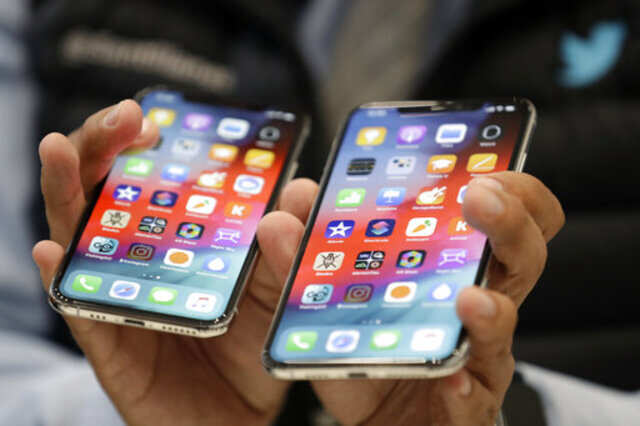Why Apple’s latest move might have the Indian government worried
Debashis Sarkar | Gadgets Now | Sep 24, 2018, 07:00AM IST
It is Apple that is -- in a way -- driving the early e-SIM adoption in India. The Cupertino-based tech giant had launched its Apple Watch Series 3 Cellular in May this year in a partnership with Reliance Jio and Bharti Airtel. Now, it has officially introduced dual SIM connectivity via eSIM on its latest 2018 iPhone lineup which includes the iPhone XS, XS Max and XR. For now, there are the only 10 countries worldwide where eSIMs work and India is one of them.
Apple will provide eSIM support through a software update for the new iPhones later this year. Now, the ability for a mobile handset manufacturer and telecom operator alike, to offer SIM support electronically "over-the-air" is something that could raise eyebrows within the government.
"The government has certain security concerns around the usage (or misuse) of SIM cards. India is among the few countries that require KYC verification of the subscribers. With the rise of adoption in the eSIM in India, security concerns will become a key factor very soon for both the telecom operators and the government," said, Rajan S. Mathews, DG, Cellular Operators Association of India (COAI).
With India being one of the biggest smartphone market globally, iPhones continue to have a high aspiration value for the Indian consumers. Now, in order to compete, smartphone brands, mostly Chinese, tend to offer similar features of the latest iPhone at a far cheaper price. For example, Apple introduced the display notch last year and now every affordable Android handset has it.
So, with Apple spearheading the eSIM revolution in India, we can expect Chinese brands and other local players to join the eSIM bandwagon soon. And when eSIM starts gaining traction quickly, the government may soon be forced to look deep into how they work and set guidelines to safeguard the privacy of eSIM users.
While telecom operators will have to adhere to the guidelines set by the government to enroll new subscribers, the concern for the government with eSIM could be slightly different.
"Questions like can eSIMs be programmed from outside the country. Or, what kind of facilities does the device manufacturer continue to have after selling a handset with eSIM functionality. There could be concerns around eSIM data privacy and what kind of eSIM data will the device manufacturer (outside India) have access to. Also, there will be concerns around mobile number portability and international roaming," said Mathews.
For those unaware, eSIM is a virtual SIM ID that is generated by a telecom operator and that SIM ID is simply registered with the IMEI number of your phone/smartwatch. There is no need to purchase a separate physical SIM card for it.
Apple will provide eSIM support through a software update for the new iPhones later this year. Now, the ability for a mobile handset manufacturer and telecom operator alike, to offer SIM support electronically "over-the-air" is something that could raise eyebrows within the government.
"The government has certain security concerns around the usage (or misuse) of SIM cards. India is among the few countries that require KYC verification of the subscribers. With the rise of adoption in the eSIM in India, security concerns will become a key factor very soon for both the telecom operators and the government," said, Rajan S. Mathews, DG, Cellular Operators Association of India (COAI).
With India being one of the biggest smartphone market globally, iPhones continue to have a high aspiration value for the Indian consumers. Now, in order to compete, smartphone brands, mostly Chinese, tend to offer similar features of the latest iPhone at a far cheaper price. For example, Apple introduced the display notch last year and now every affordable Android handset has it.
So, with Apple spearheading the eSIM revolution in India, we can expect Chinese brands and other local players to join the eSIM bandwagon soon. And when eSIM starts gaining traction quickly, the government may soon be forced to look deep into how they work and set guidelines to safeguard the privacy of eSIM users.
While telecom operators will have to adhere to the guidelines set by the government to enroll new subscribers, the concern for the government with eSIM could be slightly different.
"Questions like can eSIMs be programmed from outside the country. Or, what kind of facilities does the device manufacturer continue to have after selling a handset with eSIM functionality. There could be concerns around eSIM data privacy and what kind of eSIM data will the device manufacturer (outside India) have access to. Also, there will be concerns around mobile number portability and international roaming," said Mathews.
For those unaware, eSIM is a virtual SIM ID that is generated by a telecom operator and that SIM ID is simply registered with the IMEI number of your phone/smartwatch. There is no need to purchase a separate physical SIM card for it.
Subscribe and get the
top tech news of the day
Delivered to your mailbox






All Comments (0)+^ Back to Top
Refrain from posting comments that are obscene, defamatory or inflammatory, and do not indulge in personal attacks, name calling or inciting hatred against any community. Help us delete comments that do not follow these guidelines by marking them offensive. Let's work together to keep the conversation civil.
HIDE